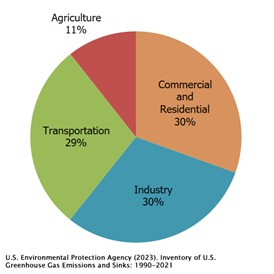SECOND EDITION
By A.W. Schultz
North Texas, USA
Abstract
In today’s increasingly eco-conscious world, smart factories have a vital role in minimizing industrial operations’ carbon footprint. While technological advancements have enabled these factories to become more energy-efficient, employees’ active involvement and commitment truly drive down greenhouse gas emissions. Currently, factories are responsible for producing the largest amount of greenhouse gases (29%). The European Commission (EC) has determined that to achieve this goal, we undergo an industrial evolution, which the EC is calling Industry 5.0. Industry 5.0 will focus on sustainability, resilience, and human-centricity. However, bringing these factories into existence requires employee engagement, and it can be challenging for factories when employees show little interest. This topic aims to explain how smart factories are changing and how there is a direct need for people in factories to bring forward Industry 5.0.
 The smart factories leverage advanced technologies such as the Internet of Things (IoT), artificial intelligence (AI), and robotics to enhance productivity, efficiency, and connectivity. However, amidst all the excitement surrounding these advancements, it is crucial to recognize the importance of engaging employees in this new era. According to a recent global Gallup poll, only 23% of employees feel engaged in their work. With a new workforce and factories dealing with evolutional change such as the “Great Resignation,” transformation is hard.
The smart factories leverage advanced technologies such as the Internet of Things (IoT), artificial intelligence (AI), and robotics to enhance productivity, efficiency, and connectivity. However, amidst all the excitement surrounding these advancements, it is crucial to recognize the importance of engaging employees in this new era. According to a recent global Gallup poll, only 23% of employees feel engaged in their work. With a new workforce and factories dealing with evolutional change such as the “Great Resignation,” transformation is hard.
Smart factories of the future will use advanced technologies like IoT, AI, and robotics to improve productivity, efficiency, and connectivity. They must produce more with less to reduce greenhouse gases and meet the 2050 net zero goal. The US industrial sector currently contributes 30% to greenhouse gases (US EPA, 2021).
The European Commission determined that meeting this goal requires a new industrial revolution – Industry 5.0, built on sustainability, resilience, and human-centricity. However, achieving these factories requires employee engagement. This topic will explore the changes in smart factories and the direct need for people to bring forward Industry 5.0.
Keywords: Industry 5.0, Sustainability, Resilience, Human Centric, Smart Factory, Engagement, Motivation, Transformation, Diversity, Equity, and Inclusion (DEI)
Introduction
Today’s advances in factory technology, digitalization, and enhancement in flexibility have turned factories into smart factories, also known as Industry 4.0. However, the supply chain is embarking on a challenging time as businesses are seeing the push to reduce greenhouse gases through government and corporate initiatives (Jafari et al., 2022). As Ivanov (2022) suggests, smart factories are changing practices by bringing the resilience of Industry 4.0 to drive sustainability within the industries, seeing the need to engage the smart factory workforce to drive sustainable solutions to reduce greenhouse gases. The concept of Industry 5.0 was developed by the European Commission (EC) in 2021 as the EC was determining how countries could meet the Paris Agreement to be “net zero emissions” by 2050 (United Nations [UN], n.d.). The EC (2021) determined that a three-part approach around sustainability, resilience, and human-centricity would need to occur to create a framework for the rapid development of innovation within the value chain.
More…
To read entire paper, click here
Editor’s note: Second Editions are previously published papers that have continued relevance in today’s project management world, or which were originally published in conference proceedings or in a language other than English. Original publication acknowledged; authors retain copyright. This paper was originally presented at the 16th UT Dallas PM Symposium in May 2024. It is republished here with the permission of the author and conference organizers.
How to cite this paper: Schultz, A. W. (2024). Industry 5.0: Engaging Employees in Smart Factories; presented at the 16th University of Texas at Dallas Project Management Symposium in Richardson, TX, USA in May 2024; republished in the PM World Journal, Vol. XIII, Issue IX, September. Available online at https://pmworldlibrary.net/wp-content/uploads/2024/09/pmwj145-Sep2024-Schultz-Industry-5.0-Engaging-Employees-in-Smart-Factories.pdf
About the Author

A.W. Schultz
Dallas, TX, United States
![]()
A.W. Schultz, PMP is a scholar, consultant, Amazon best-selling author, and international speaker. A.W. works with those in asset management within the manufacturing communities. Specializing in improving performance and sustainability within smart factories or robust asset care programs.
A.W. has worked in manufacturing for over two decades in various industries, roles, and locations. He holds two bachelor’s degrees and an MBA and is currently working on a doctorate in Organizational Change. A.W. is a certified Project Management Professional, a Master Black Belt in Six Sigma, and a Certified Maintenance Reliability Professional.
He can be contacted at aw@awschultz.org or https://www.linkedin.com/in/awschultz/









